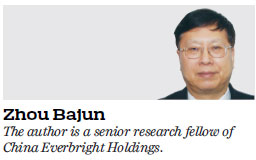Financial fortress US drives us to stronger integration
Updated: 2018-03-14 06:51
(HK Edition)
|
|||||||
The first session of the 13th National People's Congress opened on March 5 in Beijing, when Premier Li Keqiang announced in his Government Work Report that China will "work on a steady increase of direct foreign investment. It will step up efforts to meet widely accepted international trade rules; building an international first-rate business environment; fully opening its general manufacturing industry; further opening such sectors as telecommunications, healthcare, education and new-energy automobiles; opening up its bank card clearing market; easing up restrictions on the business scope of foreign insurance companies; easing or lifting restrictions on the percentage of stakes held by foreign investors in Chinese banks, securities, fund-management firms, futures and financial asset management companies; unifying standard permission to enter China's banking market for both Chinese and foreign banks; and implementing deferred tax on plowback (ratios) by overseas investors in China."
On the same day in the United States, The Wall Street Journal reported that Chicago Stock Exchange (CHX) and North America Casin Holdings (NACH) said in a joint statement they had agreed to end the proposed sale of CHX to NACH; negotiations had started two years ago. NACH is a consortium formed by a few Chinese and US investors to buy a stake in CHX worth $20 million but the report left readers with the impression that only the Chinese investors mattered in the botched deal. CHX accounts for less than 1 percent of the value of stock exchanges in the US, yet the Securities and Exchange Commission cited US financial security as excuse to block the sale of a CHX stake to NACH.

While China opens up financial markets to foreign investors, the US is closing the doors of its markets in the faces of Chinese investors. The sharp contrast reflects an unprecedented and profound adjustment to the global economic, financial and political situation. It shows the administration of US President Donald Trump is adjusting its global strategies, with China seen as a main rival. The administration's refusal to permit Chinese investment into the US follows the same logic as curbing Chinese exports to the US.
Faced with this situation, should Hong Kong's financial markets watch this unfold without taking necessary measures to avoid collateral damage? The correct answer is obviously that the city must adopt the appropriate measures. The US government's rejection of Chinese mainland investment has yet to affect Hong Kong directly but it is only a matter of time before it does. Moreover, the newly announced higher tariffs on imported aluminum will affect Hong Kong's exports of the metal to the US. Hong Kong should accelerate its integration into the country's overall development strategy, especially its financial market connections with the mainland, before the US government kicks Hong Kong investors out of the US as well.
Firstly, after the launch of "Bond Connect" last year Hong Kong investors can access the mainland bond market. Hong Kong should open its own bond market to mainland investors soon.
Secondly, implement at an early date those areas involving financial cooperation between the mainland and Hong Kong in the arrangements between the National Development and Reform Commission and the Hong Kong Special Administrative Region Government for Hong Kong to fully participate in the Belt and Road Initiative. This includes efforts to facilitate the internationalization of the renminbi by strengthening Hong Kong's status as the world's leading offshore RMB trade hub with a better two-way channel for cross-boundary RMB flow between Hong Kong and the mainland. Also encourage the use of the cross-border interbank payment system established by the People's Bank of China to enhance interconnectivity of the two regions' capital markets and make regulated cross-boundary investment between Hong Kong and the mainland easier; support financial institutions (including related investment firms and multilateral banks) involved in the B&R Initiative by forging cooperative relations with Hong Kong, opening branches for capital and market operations in the SAR according to relevant laws, regulations, rules and protocols and encouraging financial institutions which already have branches in Hong Kong to expand their businesses.
Thirdly, while building up the Guangdong-Hong Kong-Macao Greater Bay Area city cluster, Hong Kong needs to promote coordinated development of its own financial markets with Shenzhen's - especially the two cities' stock markets. Relevant decision-makers need to think about this - in order to advance coordinated development of the two stock markets, shouldn't they avoid direct competition with each other and agree on a division of labor?
Fourthly, when mainland securities markets consider attracting internet giants such as Tencent, Baidu, JD.com and Alibaba, which are currently listed on Hong Kong and overseas stock markets, back home through Chinese depositary receipts, Hong Kong Exchanges and Clearing should allow listings of weighted voting right structures or dual-class shares sooner rather than later. This is to attract mainland-based rising tech companies to publicly list in Hong Kong. Alibaba originally wanted to go public in Hong Kong but gave up after a year of negotiations and chose to list on the New York Stock Exchange instead. Alibaba chose the US because HKEx does not permit dual-class structures. It was reported that HKEx may begin accepting dual-class listings as early as next month but applicants must meet some very steep requirements to qualify.
(HK Edition 03/14/2018 page9)